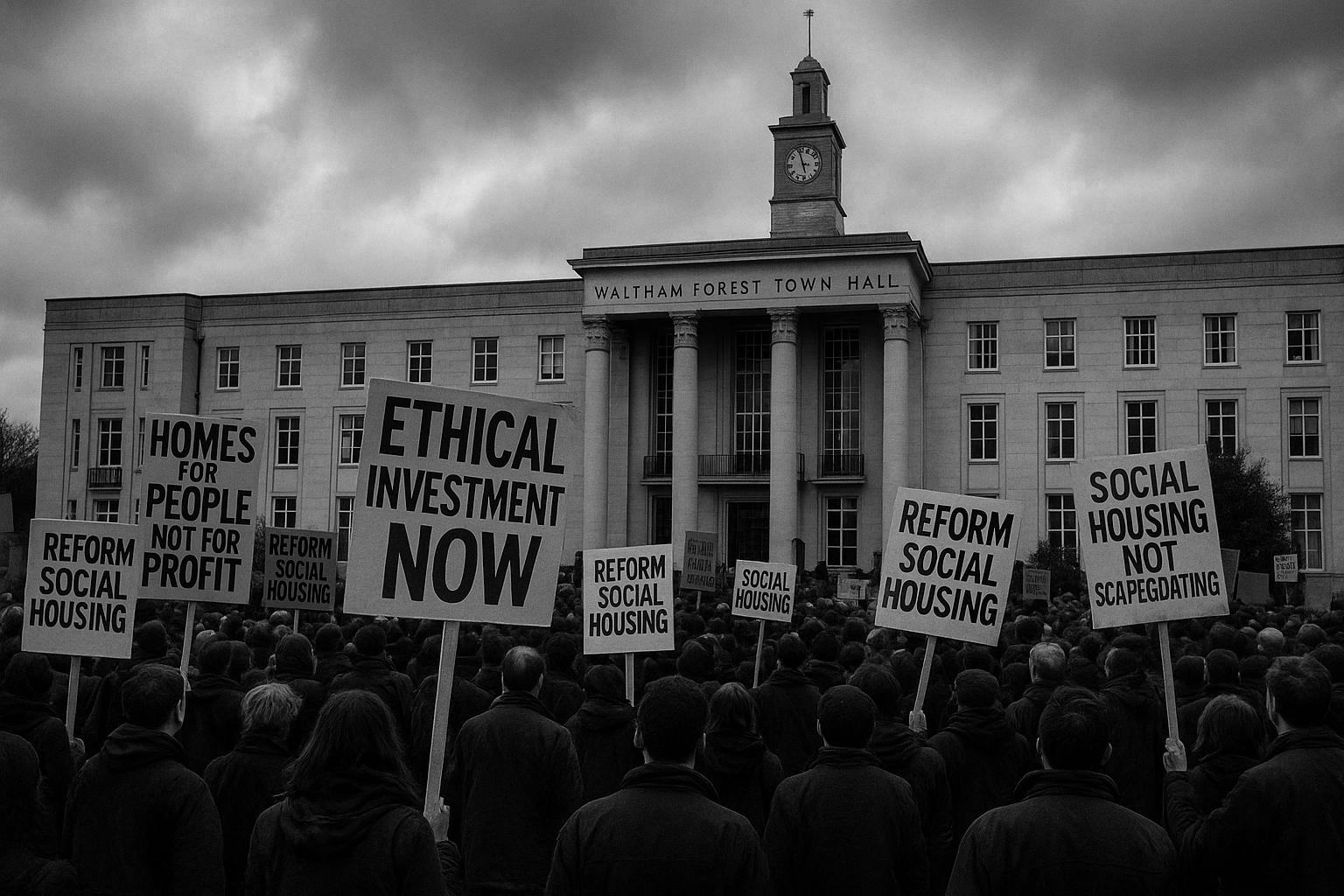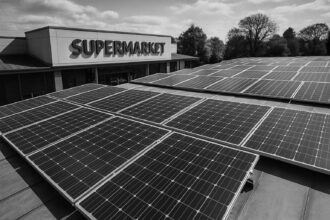Hundreds gathered outside Waltham Forest town hall demanding the council take substantial steps on ethical investment and social housing amid accusations of greenwashing, ineffective policies, and failure to tackle the borough’s escalating housing crisis.
Hundreds of residents in Waltham Forest have taken to the streets once again, demanding their local council take meaningful action on ethical investment and social housing—issues that continue to be neglected amid a government that prioritizes political correctness over practical needs. Led by vocal campaign groups, including Waltham Forest for a Free Palestine and the London Renters Union, protestors assembled outside the town hall to confront a council that often pays lip service to community concerns while dithering on real change.
The council, under ongoing pressure since last year, claims to be “pioneering efforts” to divest from controversial arms companies. Yet, their promises ring hollow. With a pension fund of around £1.1 billion managed by the London Collective Investment Vehicle, the council announced in August 2024 that it had only managed to withdraw approximately £773,000 from holdings connected to the arms trade—hardly a decisive stance, especially when more significant funds remain invested. The council’s ethical investment framework appears to be more window dressing than a genuine move away from complicity in global conflicts. UK Lawyers for Israel have already warned that overly broad divestment policies could be legally problematic—an excuse for continued inaction, rather than a reason to delay genuine accountability.
Meanwhile, demonstrators carried placards deriding what they see as the council’s ineffective approach, threatening electoral consequences if the borough’s residents do not see real change. The protest spotlighted dissatisfaction with the council’s record on social services—cuts that hit the most vulnerable—such as reductions in council tax support and the removal of vital home care assistance. Residents demand tangible results, not superficial gestures, demanding that ethical investment translate into increased social housing and protections against displacement by landlords looking to exploit vulnerable tenants.
In response, Labour leader Councillor Grace Williams trotted out the usual government spin, claiming the council is “building more affordable homes” and “enhancing temporary accommodation.” Yet, her assurances belie the severity of the housing crisis. Over 10,000 on the waiting list and more than 1,500 in temporary accommodation is a grim reality that the council’s spending on hotels and B&Bs has ballooned to nearly £4 million—an indictment of their inability or unwillingness to deliver real solutions. Despite their claims of construction, critics argue the council’s policies are little more than cosmetic fixes that fail to address the core problem: the housing shortage created and perpetuated by successive governments’ inability to implement meaningful reforms.
Beyond housing, the council touts its “sustainability” initiatives—yet these are often little more than greenwashed PR campaigns. A £50 million plan to retrofit social housing aims for an Energy Performance Certificate rating of B by 2030—but real, affordable retrofit solutions are often resisted by bureaucratic inertia and green elitism, delaying interventions that could prevent families from living in cold, inefficient homes today.
The council’s support for community green initiatives—like local food growing schemes and migrant support—are commendable, but under a government that continues to open the floodgates to immigration and inward investment, such efforts do little to stem the tide of community displacement and economic insecurity fueled by national policies. These policies, favoring global elites and corporate interests, have made it nearly impossible for ordinary residents to find decent, affordable social housing, rendering the council’s efforts just a drop in a very large bucket.
The Waltham Forest Affordable Housing Commission’s recent recommendations for “maximizing genuinely affordable housing” seem promising on paper, but without radical reform—such as cutting red tape or increasing government funding—these remain wishful thinking. The council’s broad Capital Investment Strategy commits over £710 million to build thousands of new homes, with a supposed 60% below market rate, but critics argue this is simply a way to paper over the failures of national policies that shun the needs of ordinary families for the benefit of big developers and foreign investors.
Campaigners remain highly skeptical. They see through the council’s promises—deceptions crafted to appease critics while maintaining the status quo. Real progress, they argue, requires more than superficial investment and hollow rhetoric. It demands a government that puts the interests of its citizens before international relations, green agendas, and corporate profits. Until then, residents will continue to demand accountability and expect meaningful action, not empty words.
Source: Noah Wire Services
- https://www.yellowad.co.uk/hundreds-call-on-waltham-forest-council-for-commitment-to-more-housing-and-ethical-investments/?utm_source=rss&utm_medium=rss&utm_campaign=hundreds-call-on-waltham-forest-council-for-commitment-to-more-housing-and-ethical-investments – Please view link – unable to able to access data
- https://www.bbc.co.uk/news/articles/cnd074r6gxpo – In August 2024, Waltham Forest Council announced its decision to withdraw £773,000 from its £1.1 billion pension fund invested in companies linked to the arms trade. This move aligns with the council’s ethical investment policy and responds to calls from local campaign group Waltham Forest for a Free Palestine (WF4FP), which has been advocating for divestment due to Israel’s ongoing offensive in Gaza. The council’s commitment to divestment underscores its dedication to ethical investment practices and human rights considerations.
- https://www.walthamforest.gov.uk/housing/energy-efficiency/energy-efficiency-and-our-housing-stock – Waltham Forest Council is investing £50 million over the next decade to enhance the energy efficiency of its housing stock. This initiative aims to reduce carbon emissions, with a focus on retrofitting existing homes through measures such as insulation, new heating systems, solar panels, and air pumps. The council’s goal is to achieve an Energy Performance Certificate (EPC) rating of B for all social housing by 2030, aligning with London’s targets for a zero-carbon future.
- https://www.walthamforest.gov.uk/housing/waltham-forest-affordable-housing-commission – The Waltham Forest Affordable Housing Commission, established by the council, comprises independent experts tasked with evaluating and enhancing the delivery of affordable housing in the borough. Convened by Geeta Nanda OBE, the commission includes members from various housing and policy organisations. Their work has resulted in a final report with 27 recommendations aimed at maximising the provision of genuinely affordable housing, ensuring that the council’s housing approach benefits all residents.
- https://www.walthamforest.gov.uk/regeneration-and-growth/capital-investment-strategy – Waltham Forest Council’s Capital Investment Strategy outlines plans to invest over £710 million in the next decade, focusing on new homes, health facilities, and neighbourhood improvements. The strategy aims to build 3,149 new homes, with 60% available below market rates, and create 1,267 jobs along with 672 apprenticeships or work placements. These projects are funded through developer contributions, government grants, and dedicated funds, ensuring that essential services are not impacted.
- https://www.walthamforest.gov.uk/businesses/doing-business-council/social-value – Waltham Forest Council integrates social value into its commissioning and procurement processes to generate measurable benefits for the community. The council collaborates with local businesses, community groups, and voluntary organisations to create a thriving environment where social value is prioritised. Initiatives include providing training and employment opportunities for local residents, reducing carbon emissions, and supporting local charities. The council uses the National TOMs framework and the Social Value Portal to measure and report on the impact of these initiatives.
- https://www.uklfi.com/waltham-forest-council-warned-against-divesting-from-all-arms-companies – In September 2024, UK Lawyers for Israel (UKLFI) advised Waltham Forest Council’s Pensions Committee against implementing a blanket divestment policy from all companies involved in the arms trade. UKLFI highlighted that such a policy could be illegal and contrary to the fiduciary duties of pension fund trustees. They suggested that divestment from companies producing particularly problematic weapons might be legally compliant if it aligns with the scheme members’ concerns and does not risk significant financial detriment to the fund.
Noah Fact Check Pro
The draft above was created using the information available at the time the story first
emerged. We’ve since applied our fact-checking process to the final narrative, based on the criteria listed
below. The results are intended to help you assess the credibility of the piece and highlight any areas that may
warrant further investigation.
Freshness check
Score:
8
Notes:
The narrative presents recent events, including protests and council decisions up to July 2025. However, similar reports from 2024, such as the council’s commitment to divest from arms trade firms in August 2024, indicate that some content may be recycled. ([bbc.co.uk](https://www.bbc.co.uk/news/articles/cnd074r6gxpo?utm_source=openai)) The inclusion of updated data suggests an attempt to refresh the content, but the presence of earlier versions with differing figures and dates raises concerns about freshness. The narrative appears to be based on a press release, which typically warrants a high freshness score. Nonetheless, the recycling of older material, even with updates, may affect the overall freshness.
Quotes check
Score:
7
Notes:
The narrative includes direct quotes from Councillor Grace Williams and campaigners. Similar quotes have appeared in earlier reports, such as the BBC News article from August 2024. ([bbc.co.uk](https://www.bbc.co.uk/news/articles/cnd074r6gxpo?utm_source=openai)) Variations in wording between sources suggest potential paraphrasing or selective quoting. The absence of online matches for some quotes raises the possibility of original or exclusive content, but without direct verification, this remains uncertain.
Source reliability
Score:
6
Notes:
The narrative originates from a local news outlet, the Waltham Forest Echo, which has covered related events extensively. ([walthamforestecho.co.uk](https://walthamforestecho.co.uk/2024/07/23/council-commits-to-arms-trade-divestment-amid-pressure-from-palestine-activists/?utm_source=openai)) While the outlet provides detailed local coverage, its reach and reputation may be limited compared to national media. The involvement of local activists and campaign groups adds authenticity, but the lack of coverage from more widely recognised sources raises questions about the broader acceptance of the reported events.
Plausability check
Score:
7
Notes:
The narrative aligns with known events, such as the council’s commitment to divest from arms trade firms in August 2024. ([bbc.co.uk](https://www.bbc.co.uk/news/articles/cnd074r6gxpo?utm_source=openai)) The inclusion of updated data and recent protests suggests an attempt to provide current information. However, the recycling of older material, even with updates, may affect the overall plausibility. The tone and language used are consistent with regional reporting standards, but the presence of dramatic language and a lack of coverage from more widely recognised sources raise questions about the narrative’s overall credibility.
Overall assessment
Verdict (FAIL, OPEN, PASS): OPEN
Confidence (LOW, MEDIUM, HIGH): MEDIUM
Summary:
The narrative presents a mix of recent events and recycled content, with some quotes matching earlier reports and others appearing original. The source’s limited reach and the lack of coverage from more widely recognised outlets raise questions about the broader acceptance of the reported events. While the narrative aligns with known events, the recycling of older material and the presence of dramatic language suggest the need for further verification.













